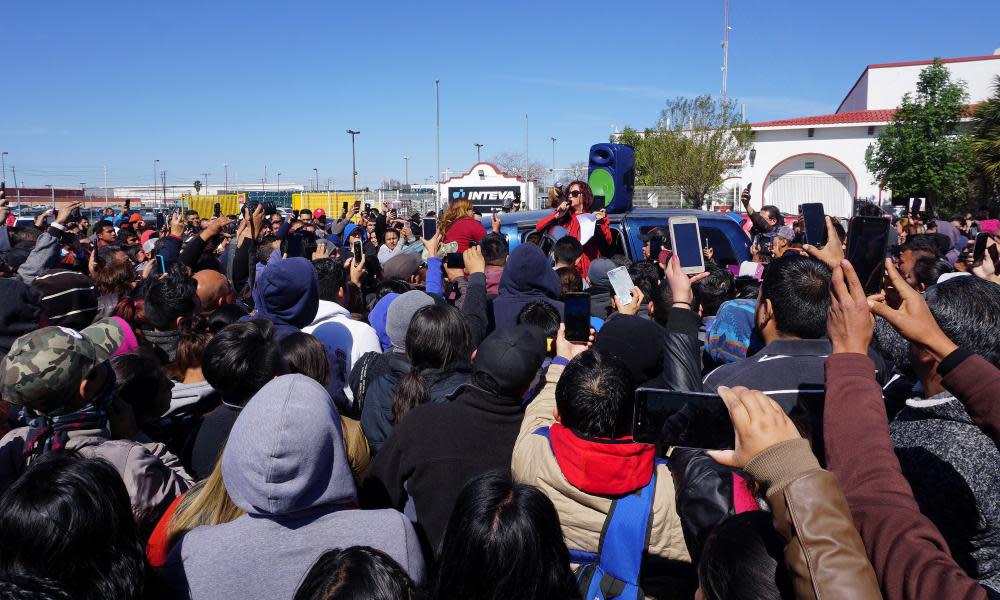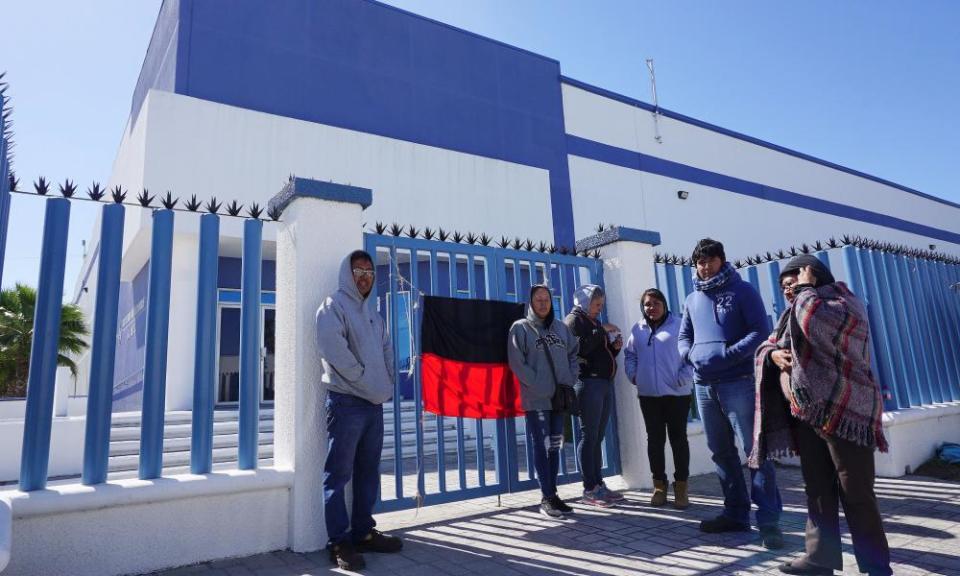'We won't be trampled on': striking Mexican workers vow to fight the fight

Despite the winter chill in the air, the mood on the picket line outside the Matamoros Coca-Cola bottling plant was optimistic.
“We’re not fighting for ourselves, but for a better quality of life for our kids and their children. They won’t be screwed over or trampled upon by these kinds of people any more,” said Juan Luis Gaytán, 37, a mechanic at the plant, which is operated by Arca Continental, the world’s second-biggest Coca-Cola bottler.
Workers dressed in khaki uniforms brandished colourful homemade signs reading “We continue the struggle” and “20-32” – a reference to the strikers’ demand of a 20% pay hike and a one-off 32,000-peso bonus.
A wave of wildcat strikes has rolled across this Mexican border town, as thousands of workers walked off the job to demand better salaries, safer conditions – and union leaders who put members’ concerns ahead of company interests.
The strikes have closed or slowed production at dozens of maquiladora assembly plants and other factories located south of the border to take advantage of lower labour costs.
But more than two weeks after the strike began, companies are still underestimating the workers’ determination, Gaytán said. “They’re absolutely confident we will give in. But if we give in, then things will stay the same.”
There have already been some victories: 48 maquiladoras represented by the Matamoros Industrial Workers and Labourers’ Union announced a settlement to end their stoppages on 9 February, “having met the demands of our unionised workers”.
But local activists say the strikes are succeeding in spite of – not because of – the unions.
At protest camps across the city, workers complain that union leaders are good at collecting membership dues, but not so efficient when it comes to sharing information or even copies of their collective contracts.
“The union has always had us by the throat,” said Heriberto Lomas, a striking employee at a plant manufacturing controls. “Everyone is scared they’ll be fired. That’s why they haven’t gone on strike before.”
Despite paltry wages and shabby working conditions, widespread strikes are a rarity in Mexico. Business leaders boast often of “labour peace” – a euphemism for pliant unions, often chosen by the company itself, which receive a kind of “protection money” from management rather than negotiate on behalf of the workers.
Nine out of 10 collective-bargaining contracts are agreed to without the consent – and sometimes without the knowledge – of the company’s workers, according to the Wall Street Journal.
Unused to negotiating, companies have been caught off-guard by the sudden outbreak of collective bargaining, said Aldo Muñoz, a labour expert at the Autonomous University of Mexico State.
“Companies pay more money to protection unions than the bonuses that the striking workers are asking for in Matamoros,” he said.
The strikes have spread like wildfire in Matamoros, a city of 450,000 which sits across the border from Brownsville, Texas and has become a magnet for impoverished workers from across the country.
Abdio Lorenzo moved to Matamoros 20 years ago from Veracruz and now employs 32 people in a company handling chemical waste. His invoices are going unpaid because of the strike, but like many locals, Lorenzo expressed sympathy for the strikers.
“People aren’t listening to their labour leaders any longer,” he said. “It’s become a social movement.”
The immediate trigger for the strikes was the inauguration in December of new president Andrés Manuel López Obrador, known as Amlo, who campaigned on a promise to improve workers’ conditions and promote independent unions.
Amlo has not commented on the Matamoros strikes, but observers say he inadvertently triggered the walkouts with a promise to double the minimum wage to 176.20 pesos per day ($9.28) in the northern border region.
The increase triggered a clause in some collective contracts in the city which index link pay rises to the minimum wage. In turn, workers on other contracts walked off the job, demanding the same 20-32 deal.
Even non-unionised workers have joined the strike, such as delivery drivers at the local dairy.

Under a ragged tent pitched outside the Leche Vakita plant, strikers invoked the 20-32 deal, before a rail-thin driver pulled out a neatly printed list of other demands: paid overtime when trucks break down, life insurance – and danger money for out-of-town routes which take them through the most dangerous killing fields of Mexico’s drug war.
“They’ve promised these things for years and not done anything,” said Martín Villanueva, who told the story of a colleague who was shot and killed after he got caught in a shootout between rival narcos.
He had barely finished speaking when a car pulled up by the picket line, and a stocky man marched up to the drivers shouting that one of their trucks had damaged his vehicle.
He pulled a gun, sending strikers – and a Guardian correspondent – running for cover.
The drug-fueled violence which has racked the surrounding Tamaulipas state has not affected its booming economy. But local industrialists say that the strike has caused 1,500 job losses – and they are uneasy that it could spread across the borderlands.
“There’s a lot of unease over the fallout [of the strike],” Claudio X Gonzalez, a former president of the Mexican Business Council, recently told Reforma. “Losses are great because we’re living in a world that is very integrated with supply chains that have to be very efficient and effective, and when you stop them, things foul up and costs rise.”
An Arca Continental spokesman said its wages and benefits “were 48% to 120% better than the maquiladora industry”, while it offered “one of the best-paid jobs in the city”.
Susana Prieto Terrazas, a veteran labour lawyer who has been advising the strikers, said that she could not remember a similar outbreak of labour activism in Mexico.
“Workers can’t make ends meet and they don’t even make enough to buy a basic basket of goods,” she said in an interview. “The working class is at the end of its tether.”

 Yahoo News
Yahoo News 
